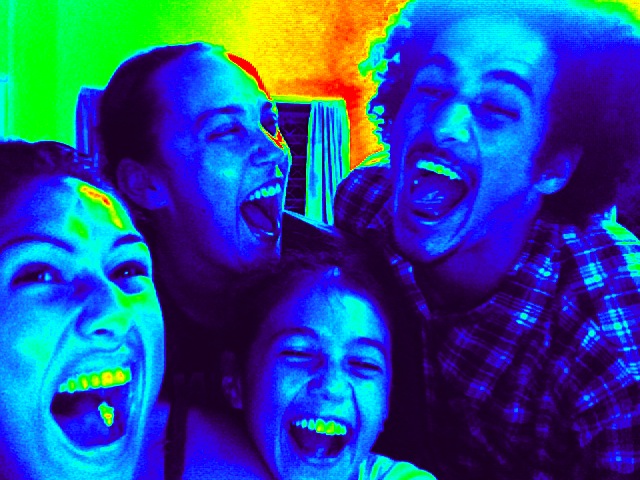Tuesday, February 26, 2008
WHY 'LAUGH OUT LOUD'??
hmm ..for the sake of WHAT??... well, there are a few possibilities, is it for the sake of:
- making something seem funny that really..Isn't ???...lol
-or to remind the reader to laugh.. in case they forget?????..lol
-or because they think it stands for something else like..'Lots Of Love' or 'Like or Love'or -if they totally missed The Basics Of Abbreviations Lesson 1 or.. don't speak English- something like 'LOLlypops are yum' or 'Licking Old Lions' (random!!) ??????... LOL
well, just in case it wasn't as obvious as I had hoped.. none of these are Correct... the abbreviation 'LOL' means Laugh Out Loud and if you choose to use "LOL", it should be because you, at that point in typing or writing, have been inspired to LAUGH OUT LOUD!!! AND, if so, ... it's Important That you Do!! BECAUSE...
(another reason i thought this topic was appropriate: , Ironically, my name (Ruha) means 'Happy and Joyful being', according to my mum... :) ;) ;) and is often written..RUHAHAHA...hahahah/lol)
Friday, February 22, 2008
Not just for Laughs.. (Facts About Laughter):
Laughter is the biological reaction of humans to moments or occasions of humour: an outward expression of amusement.
Laughter is not confined to humans. Chimpanzees show laughter-like behaviour in response to physical contact, such as wrestling, chasing, or tickling, and rat pups emit short, high frequency, ultrasonic vocalisations during rough and tumble play, and when tickled. Rat pups "laugh" far more than older rats.
Laughter is sub-categorised depending upon the extent and pitch of the laugh- ter: giggles, chortles, chuckles, hoots, cackles, sniggers and guffaws are all types of laughter.
Smiling is a mild silent form of laughing.
Laughter differs depending upon the gender of the laughing person: women tend to laugh in a more "sing-song" way, while men more often grunt or snort.
Babies start to laugh at about 4 months of age.
John Morreall theorises that human laughter may have its biological origins as a kind of shared expression of relief at the passing of danger.
The relaxation of tension we feel after laughing may help inhibit the fight-or- flight response, making laughter a behavioral sign of trust in one's comp
anions.
Laughter is used as a signal for being part of a group - it signals acceptance and positive interactions.
On the other hand laughing at somebody is ridiculing him or her.Laughter triggers the release of endorphins. A study demonstrated neuro- endocrine and stress-related hormones decreased during episodes of
laughter, which provides support for the claim that humor can relieve stress.
Parts of the limbic system are involved in laughter. The limbic system is a primitive part of the brain that is involved in emotions and helps us with basic functions necessary for survival. Two structures in the limbic system are involved in producing laughter: the amygdala and the hippocampus.
People with certain types of brain damage produce abnormal laughter. This is found most often in people with pseudobulbar palsy, gelastic epilepsy, and to a lesser degree, with multiple sclerosis, ALS, and some brain tumors.
In most people, laughter can be induced by tickling, a phenomenon in itself. Laughing gas is sometimes used as a painkiller.
|
Friday, February 15, 2008
INSPIRING QUOTES ON L.O.L.ing...lol
"Man is distinguished from aLL Other creatures by the facuLty Of LAUGHTER." JOseph AddisOn
"ALways LAUGH when yOu can. It is cheap medicine." LOrd ByrOn
"YOu dOn't stOp LAUGHING because yOu grOw OLd. YOu grOw OLd because yOu stOp LAUGHING." Michael Pritchard
"NObOdy ever died Of LAUGHTER." Max BeerbOhm
"You can turn painful situatiOns arOund thrOugh LAUGHTER. If yOu can find humOur in it - even pOverty - yOu can survive it!" BiLL COsby
